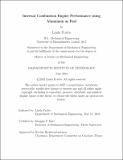Internal Combustion Engine Performance using Aluminum as Fuel
Author(s)
Pratto, Linda
DownloadThesis PDF (19.60Mb)
Advisor
Hart, Douglas P.
Terms of use
Metadata
Show full item recordAbstract
The aluminum-water reaction has been proven as a concept for a safe, economical, and energy-dense storage mechanism for hydrogen fuel. One of the challenges facing aluminum-fuel technology is the sensitivity of hydrogen fuel cells to temperature, humidity, vibrations, and particulate contamination. This paper explores internal combustion engines as an alternative energy conversion method to hydrogen fuel cells for aluminum-fuel applications. Specifically, this paper characterizes the impact of steam on engine performance. The aluminum-water reaction is highly exothermic, resulting in a high-temperature mixture of steam and hydrogen. In a fuel cell system, additional components are required to cool and dry the hydrogen which adds cost, weight and complexity. On the other hand, the higher temperature and steam content does not reduce the ability of the internal combustion engine to produce work up to molar water-fuel ratios of approximately 2.5. This work documents analytical predictions and experimental results to characterize the performance impact of steam on hydrogen internal combustion engines for use with aluminum fuel. For port-fueled injected engines, the prescience of steam reduces engine efficiency by about 8%, but increases the overall system efficiency by about 9%. For direct-injection engines, the prescience of steam increases engine efficiency by about 9% and increases overall system efficiency by 13%.
Date issued
2023-06Department
Massachusetts Institute of Technology. Department of Mechanical EngineeringPublisher
Massachusetts Institute of Technology